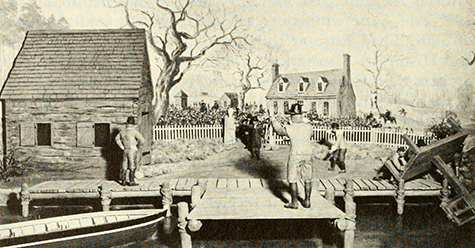fl. 1663–1681

John Varnham (Vernham), Council member, Assembly member, and leader in Culpeper's Rebellion, was one of the early landholders in North Carolina. On 25 Sept. 1663 he was granted a patent for 250 acres in the Chowan area by Sir William Berkeley, governor of Virginia and one of the recently created Lords Proprietors of Carolina. The grant was confirmed by the North Carolina colony, then called Albemarle, on 27 Nov. 1679, when officials of the colony granted Varnham the same land in the name of the Carolina Proprietors. At the time he received the patent from Berkeley, Varnham probably was officially a resident of Virginia, to which a settler bearing his name migrated before 3 Oct. 1656. It is likely, however, that he, as other early Albemarle settlers, was living on the land he patented before he received legal title to it.
Little is known of Varnham's life, as his name seldom appears in surviving records. The earliest known references to him are in accounts of the Albemarle uprising of December 1677, called Culpeper's Rebellion, in which Varnham is said to have commanded some of the armed forces of the "rebels." Varnham served in the Assembly held by the acting governor, Thomas Miller, in the fall preceding the uprising, which enacted measures responsible in part for the ensuing violence. Like a number of other members of that Assembly, however, Varnham took a leading part in overthrowing Miller. He also sat in the Assembly elected by the rebels after Miller's imprisonment.
In November 1679 Varnham was a Council member in the government headed by John Harvey, which recently had been established under authority of the Proprietors. Varnham held his seat as an "assistant," which indicates that he again was a member of the Assembly and had been elected to the Council by that body. He remained on the Council at least through March 1679/80.
Varnham's plantation was in Chowan Precinct. He was called captain, but it is not certain whether the title referred to rank in the militia or as a seaman. There are indications, however, that he was a seaman engaged in the coastal trade. He had contacts with New Englanders and served as attorney for a New England merchant in the settlement of an estate and other business in Albemarle. A connection with shipping also is implied in a reference to Varnham that occurs in a deposition relating to the handling of shipments of pork in 1680 and 1681. A Mrs. Alice Varnham mentioned in the deposition may have been his wife but is not so identified.
The fact that Varnham himself did not give evidence concerning the matters under investigation when the deposition was made indicates that he had either died, moved away from the colony, or become incapacitated by that time, which was the fall of 1682. No evidence of his being active in Albemarle after 1681 has been located.